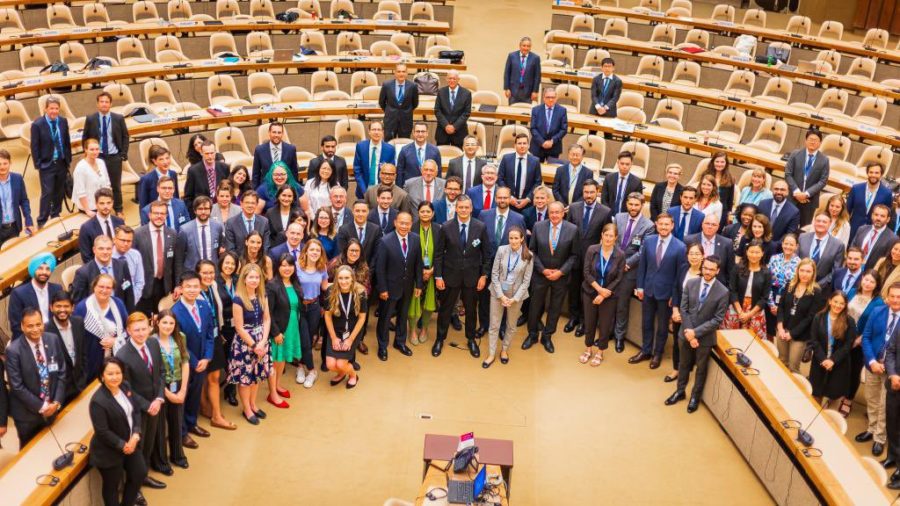2nd June 2022 Geneva, Switzerland
Disarmament: space and cluster munitions

May was a big month for 2 of the UK disarmament team’s main objectives for this year.
On 9 May, the Open Ended Working Group on Space Threats got underway at last, holding the first of its substantive (as opposed to organisational) meetings. It felt like the culmination of a process we began back in the autumn of 2019, when more than 30 countries joined a statement at First Committee suggesting a new approach to the prevention of an arms race in outer space, based on behaviours rather than weapons. But at the same time, it was just the beginning: this week-long session was the first of four to be held over 2022 and 2023, reporting back to the General Assembly in October 2023. As such, it was really important that it got off to a good start.
And it really did! This first week was dedicated to taking stock of the existing international legal framework applicable to outer space security. Our Chair, Hellmut Lagos of Chile, structured the meeting to lay on briefings from an impressive range of academic, civil society and governmental experts on a specific topic each morning, followed by an exchange between States in the afternoons. This way of working led to a really in-depth discussion, revealing broad agreement both on the applicability and validity of international law, including the UN Charter and International Humanitarian Law as well as specific space law such as the 1967 Outer Space Treaty, and on the need to build on it to take account of outer space as it is used today. But there were also some interesting exchanges on how some concepts are interpreted differently, which I hope will lead to some clarity as a result. We’ll pick up the conversation again in September, when we’ll look at current and future threats to space systems.
The following week, on 16 to 17 May, in my capacity as President of the 10th Meeting of States Parties (MSP) to the Convention on Cluster Munitions, I chaired the first CCM intersessional meeting since 2015. While no-one wants any more meetings than absolutely necessary, in what’s already a very crowded calendar – especially this year, as we work through the backlog created by the COVID pandemic – the 2nd Review Conference in 2021 decided to revive it, just for this year in the first instance, as a way of maintaining momentum, keeping States Parties and civil society abreast of the work being done to implement the Convention, and ensuring that decisions presented to the annual formal MSP are properly consulted on and prepared.
While it was a largely technical meeting, overshadowing all our discussions was the knowledge that cluster munitions are once again being used in conflict, as Russia’s illegal and brutal invasion of Ukraine continues. Images and videos of cluster munitions raining down on residential areas in Kharkiv emerged in the first days of the invasion. As Ukrainian forces push the Russian invaders back, the work to clear the deadly remnants that can kill and maim civilians – especially children – as they return to their ruined homes has already begun. The work we do in conference rooms in Geneva has to be inspired by what we can do to help people living with the scourge of these horrific weapons, and ensure no-one else has to do so in the future.
Dear Anouska, thanks for your interest! The UN website is a treasure trove of meeting papers, both the official reports and countries’ proposals in the shape of statements and working papers. You can even watch meetings back on UN Web TV if you want to see what really goes on in the room but can’t make it to Geneva.
Dear Aidan, thank you for this post! I was wondering if you could provide access to any meeting notes, as I am highly interested in the topic of arms conflict mitigation. I would love to understand how diplomats cooperate in addressing such risks.